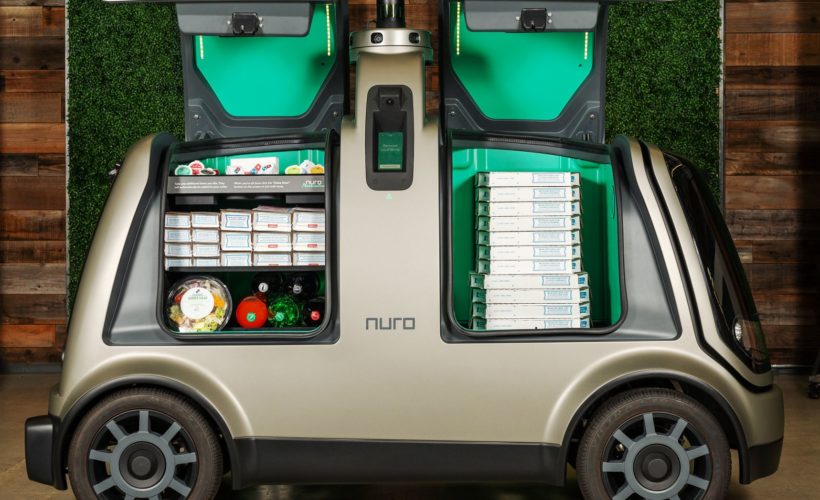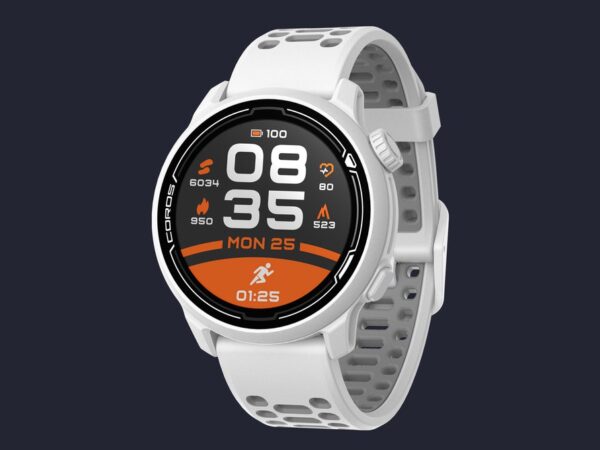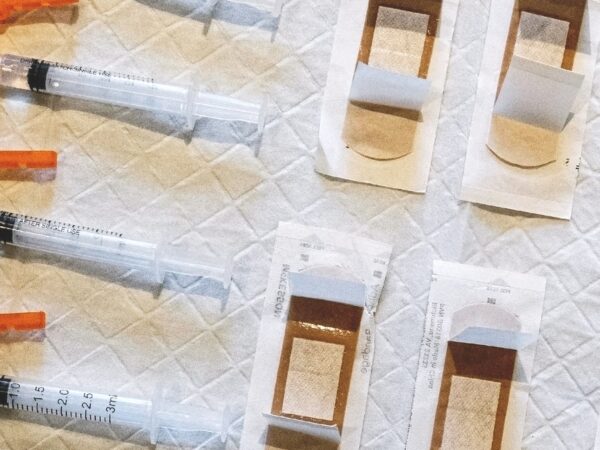Nuro, the self-driving delivery company started in 2016 by a trio of Google veterans, is moving into the pizza game. Later this year, Nuro’s robot will start delivering Domino’s pies and cheesy breads to customers in the Houston area.
The robot in question is the R2, the yet-to-be-revealed version of Nuro’s R1 vehicle, which is about half the size of a sedan and resembles an avant-garde handbag. It’s made exclusively for carrying goods—there’s nowhere for a human to fit, let alone drive. Since last year, it has been moving groceries for Kroger in Scottsdale, Arizona, and in Houston. For this Domino’s deal, hungry robophobes can opt for a human delivery. Those OK with the robot will be issued a code to enter into a screen on the bot that opens one of its two compartments so they can collect their melted cheese and whatnot.
For Domino’s, the Nuro deal is just the latest in a long string of tech-enabled delivery tactics. In 2017, it ran a short pilot with Ford’s autonomous vehicles in Ann Arbor, Michigan, and worked with Starship Technologies to greet its customers with sidewalk delivery robots in Europe. The year before that, in New Zealand, it used drones to move its pies through the skies. Because while you may think of it as the joint that kept you from starving after the college cafeteria closed, Domino’s is in fact an international logistics giant—one facing a driver shortage, with about 10,000 positions open in the US. It’s hoping robots, drones, or whatever else scoots out of Silicon Valley can help.
Nuro declined to share the financial details of the deal, but considering it raised $940 million from Softbank in February, it’s likely not too worried about what it can make from the pilot project. The bigger point is to continue exploring new options for how autonomous vehicles can become actual businesses that take humans off the street. Given that Waymo is running a ride-hail service in Arizona, May Mobility is operating shuttles in Detroit and Rhode Island, and sundry robo-truck companies are hauling goods in Florida and the southwest, Nuro’s is just the latest deal in an autonomous vehicle industry that is slowly moving away from the R&D stage. Companies that are spending hundreds of millions or even billions of dollars to take the human out of the loop are eager to start bringing in a little cash.
This new partnership will start small, says Nuro chief of strategy and partnerships, Cosimo Leipold. Likely kicking off in the fourth quarter, a single R2 vehicle will handle some deliveries for one Domino’s location in Houston. The R2 doesn’t have room for a safety driver inside, so the company will send a chase vehicle along to keep an eye on the bot and intervene if it gets into trouble.
As it goes along, Nuro will study how moving ‘za changes its model—whether its robots will require heated compartments, or special trays, or a different dispatch system. Nuro’s grocery customers select an hourlong delivery window when they place their order, so it can orchestrate its deliveries throughout the day. “Everything is much more on-demand,” Leipold says. “With grocery, it’s a little bit more scheduled, less peaky.” One goal of this partnership is to figure out how to deliver a product that customers usually expect in the next half hour, even when half the neighborhood is ordering at the same (dinner) time.
Whatever it learns, Nuro will eventually look to deploy a proper fleet of slice-slinging robots, serving several stores. (The startup will start with a corporate-owned location before looking to work with franchisees, so any early tech or operational troubles won’t risk hurting a small business owner.) And it will work to take away that chase vehicle, Leipold says. Otherwise, the economics just won’t work—and Nuro’s business will go down faster than Domino’s best pepperoni pie.
More Great WIRED Stories
- The Cold War project that pulled climate science from ice
- iPadOS isn’t just a name. It’s a new direction for Apple
- How to stop robocalls—or at least slow them down
- Everything you want—and need—to know about aliens
- How early-stage VCs decide where to invest
- ??♀️ Want the best tools to get healthy? Check out our Gear team’s picks for the best fitness trackers, running gear (including shoes and socks), and best headphones.
- ? Get even more of our inside scoops with our weekly Backchannel newsletter
Source:WIRED











